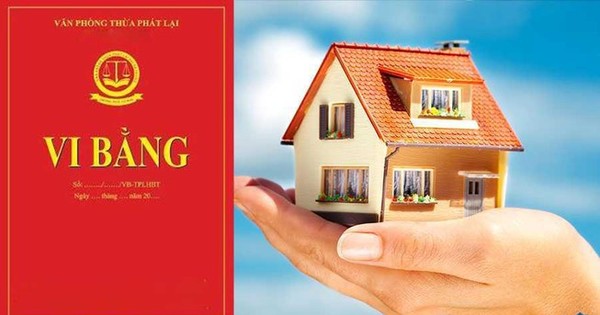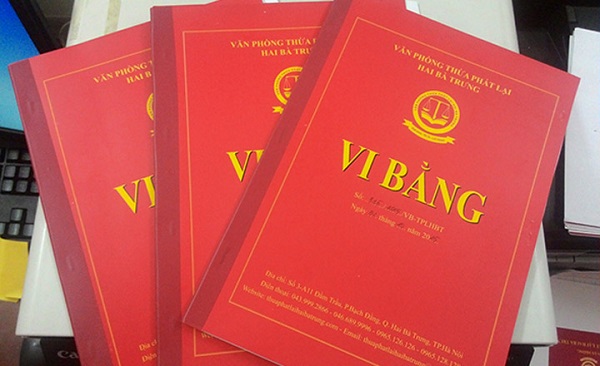What is bailiff’s report? Legitimacy of bailiff's report in Vietnam
What is bailiff’s report? What are the regulations on the legitimacy of bailiff's report in Vietnam? – Thao Vi (Phu Yen, Vietnam)

What is bailiff’s report? Legitimacy of bailiff's report in Vietnam (Internet image)
Regarding this issue, the Lawnet would like to answer as follows:
1. What is bailiff’s report?
According to Clause 3, Article 2 of Decree 08/2020/ND-CP, a bailiff’s report refers to a document which records an event or behavior witnessed by the bailiff and is produced at request of an individual, agency, or organization at request of Decree 08/2020/ND-CP.
2. Entitlement to produce bailiff’s report, scope and legitimacy of bailiff's report in Vietnam
- Bailiffs shall produce report to record actual state of affairs at request of agencies, organizations, and individuals in Vietnam, except for cases under Article 37 of Decree 08/2020/ND-CP.
- Bailiff's reports do not replace other notary documents, certifying documents, or other administrative documents.
- Bailiff’s reports serve as evidence reviewed by the court to resolve civil, administrative cases and matters as per the law; as the prelude to conduct transactions between agencies, organizations, and individuals as per the law.
- If evidential value of bailiff’s reports are reviewed and deemed necessary during assessment, People’s Court and/or People’s Procuracy can summon bailiffs, other agencies, organizations, and individuals to verify the bailiff’s reports.
Summoned bailiffs, other agencies, organizations, and individuals must present at the summoning courts, People’s Procuracies.
(Article 36 of Decree 08/2020/ND-CP)
3. Cases in which bailiff’s reports are not produced in Vietnam
- Cases mentioned under Clause 4 Article 4 of Decree 08/2020/ND-CP.
- Violation of regulations on national security and defense, including:
+ Violating national security and defense targets; disclosing classified information, spreading news, materials, items considered classified items;
+ Violating regulations on entering, exiting, or moving in restricted areas, protected areas, safety perimeters of national defense and security structures, and military zones;
+ Violating regulations on protecting classified information, national defense and security structures and military zones.
- Violation of private lives, personal secrets, family secrets according to Article 38 of the Civil Code; contradiction to social morals.
- Verification of details, signing in contracts or transactions which belong to notary or certification field as regulated by the law; verification of adequacy, legitimacy, adherence to social morals of documents translated from Vietnamese to foreign languages and vice versa; verification of signatures, certification of copies from original copies.
- Acknowledgement of events, affairs in order to transfer use right, ownership of land and/or assets that lack certificate of use right, ownership as per the law.
- Acknowledgement of events, affairs in order to conduct illegal transactions of solicitors.
- Acknowledgement of events, affairs of officials, public officials, commissioned officers, non-commissioned officers, employees, public employees in agencies, entities affiliated to the People’s Army, commissioned officers, non-commissioned officers in agencies, entities affiliated to the People’s Public Security in the performance of their duty.
- Acknowledgement of events, affairs without witnessing said events, affairs personally.
- Other cases according to regulations and law.
(Article 37 of Decree 08/2020/ND-CP)
- Key word:
- bailiff’s report in Vietnam
- Cases of land rent exemption and reduction under the latest regulations in Vietnam
- Economic infrastructure and social infrastructure system in Thu Duc City, Ho Chi Minh City
- Regulations on ordination with foreign elements in religious organizations in Vietnam
- Increase land compensation prices in Vietnam from January 1, 2026
- Determination of land compensation levels for damage during land requisition process in Vietnam
- Who is permitted to purchase social housing according to latest regulations in Vietnam?
-

- 09 Cases in which bailiff’s reports are not produced ...
- 11:51, 11/10/2022
-

- Notable new policies of Vietnam effective as of ...
- 16:26, 11/04/2025
-
.Medium.png)
- Notable documents of Vietnam in the previous week ...
- 16:21, 11/04/2025
-
.Medium.png)
- Notable documents of Vietnam in the previous week ...
- 16:11, 02/04/2025
-
.Medium.png)
- Notable new policies of Vietnam to be effective ...
- 16:04, 02/04/2025
-
.Medium.png)
- Notable new policies of Vietnam effective from ...
- 14:51, 21/03/2025
 Article table of contents
Article table of contents
